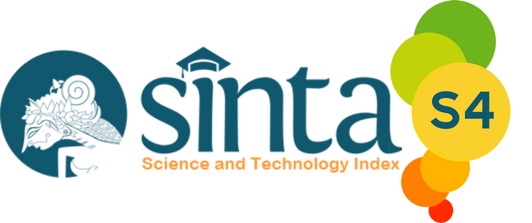PENDAMPINGAN PENGEMBANGAN KARAKTER WIRAUSAHA MELALUI KEGIATAN PRODUKSI PUPUK KOMPOS DARI LIMBAH RUMAH TANGGA DI KOTA SEMARANG
DOI:
https://doi.org/10.25273/jta.v4i1.3811Keywords:
Conservation, Production, Compost, Organic Compost, Konservasi, Produksi, Pupuk Kompos, Pupuk Kompos OrganikAbstract
Abstract. The objective of this service activity is first, instilling the character of conservation through composting for students in Kalisegoro Elementary School. The second objective is to create a set of productive behavior and entrepreneurial spirit from the creation of compost which has high economic value. The method of implementing community service activities is carried out with training that produces skills, lecture methods, question and answer, discussion, simulation and mentoring. The strategic steps are: (1) Students and teachers will be given insight into the benefits of processing waste into organic compost, (2) Students and teachers will be given training in making organic compost from household waste, (3) Discussion sessions and questions answer by giving students and teachers the opportunity to ask questions regarding the making of organic compost fertilizer, (4) Providing assistance to students and teachers in organic compost production activities, and (5) Evaluating the results of the service activities that have been carried out. The next plan is training in marketing organic compost fertilizer.
Keywords: Conservation, Production, Compost, Organic Compost
Â
Abstrak. Tujuan kegiatan pengabdian ini adalah pertama,menanamkan karakter konservasi melalui pembuatan kompos kepada siswa-siswi di SD Negeri Kalisegoro. Tujuan kedua adalah menciptakan mindset perilaku produktif dan semangat berwirausaha dari adanya pembuatan pupuk kompos yang memiliki nilai ekonomi tinggi.Metode pelaksanaan kegiatan pengabdian kepada masyarakat ini dilakukan denganpelatihan yang menghasilkan keterampilan,metode ceramah, tanya jawab, diskusi, simulasi serta pendampingan. Adapun langkah strategis yaitu: (1) Peserta didik dan guru akan diberikan wawasan tentang manfaat pengolahan limbah menjadi pupuk kompos organik, (2) Peserta didik dan guru akan diberikan pelatihan pembuatan pupuk kompos organik dari limbah rumah tangga, (3) Sesi diskusi dan tanya jawab dengan memberikan kesempatan kepada peserta didik dan guru untuk bertanya terkait pembuatan pupuk kompos organik, (4) Melakukan pendampingan kepada peserta didik dan guru dalam kegiatan produksi pupuk kompos organik, dan (5) Evaluasi hasil dari kegiatan pengabdian yang telah dilakukan. Rencana tahapan berikutnya adalah pelatihan pemasaran pupuk kompos organik.
Kata Kunci: Konservasi, Produksi, Pupuk Kompos, Pupuk Kompos Organik
Downloads
References
Ameliah, I.H., Munawaroh, M., & Muchyidin, A. 2016. Pengaruh Keingintahuan dan Rasa Percaya Diri Siswa terhadap Hasil belajar Matematika Kelas VII MTs Negeri I Kota Cirebon. EduMa, 5 (1): 9-21. http://syekhnurjati.ac.id/jurnal/index.php/eduma/article/view/598.
Asmani , Jamal Ma’mur. 2013. Buku Panduan Internalisassi Pendidikan Karakter di Sekolah. Jogjakarta: DIVA Press.
Cope, J., Watts, G., and Hulme, M. 2003. Ansoff’s matrix, pain and gain: growth strategies and adaptive learning among small food producers, International Journal of Entrepreneurial Behavior and Research, Vol.4 (2), pp. 101-11.
Fadlillah, M & Khorida, L. M. 2013. Pendidikan Karakter Anak Usia Dini: Konsep dan Aplikasinya dalam PAUD. Jogjakarta: Ar-Ruzz Media.
Gibb, A.A. 1997. Small firms’ training and competitiveness. Building on the small business. International Small Business Journal, Vol. 15 (3), pp. 13-29.
Henderson, N. 1993. Action Learning: A Missing Link in Management Development. Personnel Review, Vol.22 (6), pp. 14-24.
Kasmir. 2006. Kewirausahaan. Jakarta: Raja Grafindo Persada.
Minniti, M., and Bygrave, W. 2001. A Dynamic Model of Entrepreneurial Learning. Entrepreneurship Theory and Practice. Spring.
Smith, RM; Sardeshmukh, SR; dan Combs, GM. 2015. Uderstanding Gender, Creativity, and Entrepreneurial Intentions. Diakses dari: www.emeraldinsight.com/0040-0912.htm pada 29 Maret 2017 pukul 10:57 WIB.
Sukanti; Baswedan, A.R.; & Isroah. 2012. Peran Ibu dalam Menumbuhkan Jiwa Wirausaha Anak. Jurnal Pendidikan Akuntansi Indonesia, Vol. IX. No. 2, Hal. 79–91.
Sulivan, R. 2000. Entrepreneurial Learning and Mentoring. International Journal of Entrepreneurial Behavior & Research. Vol. 6 (3), pp. 160-175.
Rae, D. 2000. Understanding entrepreneurial learning: A Question of How? International Journal of Entrepreneurial Behavior and Research, Vol. 6 (3), pp. 145-159.
Ridlo, S., & Irsadi, A. 2012. Pengembangan Nilai Karakter KonservasiBerbasis Pembelajaran. Jurnal Penelitian Pendidikan. Vol. 29 Nomor 2. Hal. 145-154.
Ulrich, T.A. and Cole, G. S. 1987. Toward MoreEffective Training of Future Entrepreneurs. Journal of Small Business Management. Vol. 25 (4). Pp. 32.39.
Uno, H. B. & Mohamad, N. 2011. Belajar dengan Pendekatan PAILKEM. Jakarta : PT BumiAksara.
Wadhwani, D.R. 2012. How Entrepreneurship Forgot Capitalism: EntrepreneurshipTeaching and Research in Business Schools. Soc (2012) 49:223–229. DOI 10.1007/s12115-012-9535-y
Downloads
Published
Issue
Section
License
With the receipt of the article by Jurnal Terapan Abdimas Editorial Board and the decision to be published, the copyright regarding the article will be transferred to Jurnal Terapan Abdimas.
Jurnal Terapan Abdimas has the right to multiply and distribute the article and every author is not allowed to publish the same article that was published in this journal.
Every accepted manuscript should be accompanied by "Copyright Transfer Agreement" prior to the article publication.
Jurnal Terapan Abdimas by http://e-journal.unipma.ac.id/index.php/jta is licensed under a Creative Commons Attribution-ShareAlike 4.0 International License.
Â
Â





